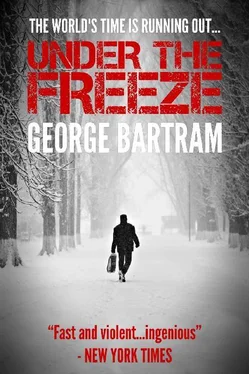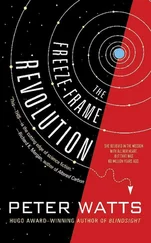“If I had flour, I would make bread,” she said.
“Tell the old man to buy flour.”
“I do not tell him anything.” She turned her face away, and he saw the shadow of a bruise high up near her pale hair.
“I will tell him, then.”
He went to the door as the guards’ Fiat came up the stony road. Laforet got out, looking Parisian and governmental, his shoes too delicate for the hard ground, his suit inappropriate but beautiful. He wore no hat but had on black gloves, and he carried a dark-gray coat over his arm. He looked out of place and too solemn, like the minister of a small country forced to negotiate its surrender in the mud of a battlefield.
“So here you are,” he said, giving Tarp his left hand. “Leave us,” he said over his shoulder to the guards. He looked around the big downstairs room. Laforet was an urbanite. He actively disliked the country; he had often said so. The stone floors and the thick whitewashed walls were not to him picturesque, but unsanitary. “Where can we talk?”
“I brought somebody with me.”
“So I heard. Is it Repin?”
“Yes.”
“So he is not dead. How like him. Well, you and I must talk; I cannot deal directly with Repin. You understand.”
Tarp led him into the small room with the wallpaper. It had big, hard chairs and a painted cupboard that was locked.
“Therese!” Tarp called. She appeared almost instantly. “Is there wine?”
She was trying not to look at Laforet, as if he terrified her. “From the village,” she said.
“Bring it.”
It came in a bottle twice the size of an ordinary one, without a label. There must be a place in the village, he knew, where you took your own bottle to have it filled from a barrel. She put down two stemmed beer glasses and hurried out.
“That looks like dreadful stuff,” Laforet said.
Tarp smiled. “You must bring your own next time.” The wine was rough, strong, almost black. Tarp liked its coarseness, and Laforet drank it without complaint.
“So,” Laforet said. “This is becoming very complex.”
“I know.”
“First you, then the woman, now Repin.” Laforet took his gloves off the table and put them on his coat, which he had folded on the seat of a chair. “Your sanctuary is becoming a commune, my friend.”
“I couldn’t leave him in London. They tried to kill me there.”
“There, too?”
“Something has gone wrong there. It smells. The whole thing smells.” He told him quickly about the meeting with Matthiessen and the shooting of Johnnie Carrington. “It smells,” he said again.
“It does, indeed.” Laforet sipped the wine, which he seemed to like better and better. For all his elegance, Laforet was honest in his tastes. Tarp had a flash of memory: Laforet bending over a jungle pool that was green with scum, drinking, raising a face then rimmed with golden beard, saying, “Nectar!” They had been on the run for four days, looking for the montagnards to hide them. Now the beard was gone, the hair was silver, but he still could take nectar on its own terms. “I must hold Repin here,” he said now.
“He’ll have something to bargain with, I’m sure.”
“He won’t be pleased. He won’t thank you for bringing him here.”
“I don’t care about his thanks.”
“You have an idea?”
Tarp poured more wine. “Moscow thinks he’s dead.”
“Not for much longer.”
“No. Let’s put out a story that Repin is in England.”
“London will deny it.”
“So?”
Laforet tapped his lower lip. “I don’t want them looking for him here. This arrangement is very much disapproved of by part of my department; nastiness would be a gift to people who want to get me out. I want things here to stay quiet. Beautifully quiet.” He sipped. “Well, we will try saying that we have heard that Repin is in London.” He crossed his legs and bent sideways to take a cigarette case from his side pocket. “About the Cuban woman.”
“Yes.”
“She is KGB, as you know. Her father is a translator in the Fifth Department. Spanish, a leftover from their civil war. You know all that? He was in the gulag, did you know that, too? Oh, yes; he was a singer, and he sang a song about Stalin. He doesn’t sing anymore. But he’s not a dissident; we have nothing on him in that direction. The daughter has been in Cuba for four years. Nothing on her, either. I would assume she works for the Eleventh Department.”
“Have you talked to her yet?”
Laforet closed the cigarette case with an audible snap. “One of my people interviewed her. She’s quite heavily sedated. Nothing worth repeating.” He gave Tarp a brief, sad smile. “She asked how you were.”
“Can she be a double?”
“Of course. But we have very little in Havana, my friend; Cuba is not our area of interest. Of course, there have always been rumors. Castro is unpredictable, to say the least. When Khruschev had the confrontation over the missiles twenty years ago, we thought it a logical time for Moscow to set up a machinery that was not known to the Cubans themselves. On the other hand, Castro has been maddeningly independent sometimes, especially in the midseventies, and we don’t know how far he may have gone in getting rid of KGB probes. We did get a Caribbean defector, curiously, about seven years ago who said in passing that she had heard that the Cuban KGB had been infiltrated by a different wing of the KGB. That was provocative. We turned it over to the Americans, and naturally we never heard anything more about it.”
“I think somebody in Moscow may have planted his own people there.”
Laforet lighted the cigarette and inhaled deeply. “Don’t you think it’s time you told me about it?” he said.
Tarp hesitated. “Do we have a deal?”
Laforet lowered his head, his eyes almost closed. “We do.” He raised his eyebrows as his head came up. “But please, no more people to share your sanctuary.”
Tarp told him about Maxudov and the plutonium. He was thorough and it took time. When it was done he said, “I think you ought to get in touch with ‘Mr. Smith.’”
“Washington and Paris are not close these days.”
“It isn’t official.”
“Very well. Are you going to Moscow?”
“Yes. I’ve got to have a way in.”
“I think I can help there. When?”
“A few days. I’ve got to tie up loose ends.”
“This business of the German ship?”
“Partly, yes.”
Laforet paused, then shook his head. “The connection is not there.”
“Not yet.”
“Ah, well.”
“I need a secure telephone to call my contacts in London, and I need the hardware to talk to my data bank.”
“I shall take you back to Paris with me.”
“I’ll need clothes.”
“I noticed.”
Mrs. Bentham had “some papers” for him, and Jenny Barnwell was “working on something.” Access to his computer from a Parisian terminal was more difficult than he had expected, and it was after midnight before the printer began to hum in the chic and soulless computer center that Laforet had borrowed for him. He was almost alone in a room that was oppressive in its insistence that all machines, all humans, all ideas were interchangeable.
“Mr. Smith” and Hacker had both been supplying information, but the sum of what they had given was not much. The biographies of the KGB officials whose names Repin had given him on the Scipio were no more revealing than if they had come from a popular magazine; there were contradictions, vast holes. There was even some confusion as to which departments of the KGB they headed.
The materials on Juaquin Schneider were more complete and, he supposed, more accurate. Yet when he had studied them he was impressed by what was not there instead of by what was. He queried the data bank but got no further answers. At first he focused on a single question: Where did Juaquin Schneider get the money when he emerged in the nineteen fifties? Then, as he went over and over the pages of mostly irrelevant material that had been given him, another question surfaced: Who was Juaquin Schneider’s wife?
Читать дальше












